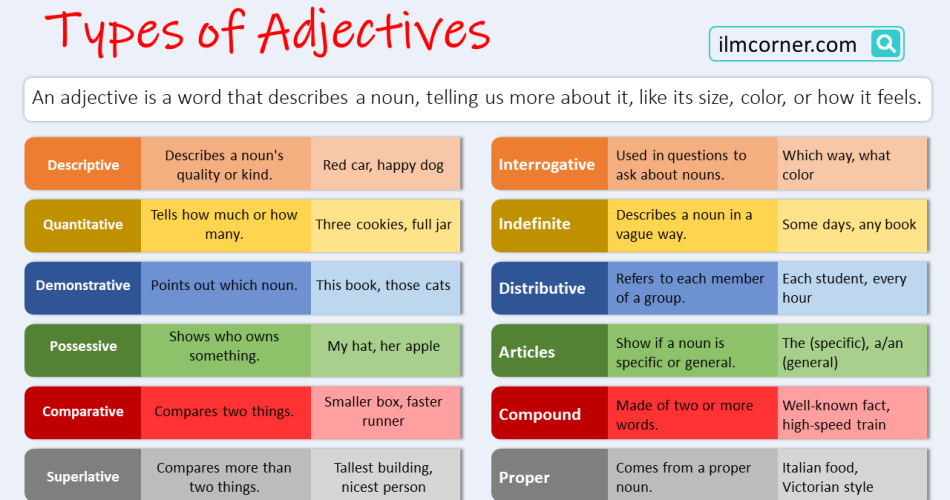In English, Types of Adjectives are words that describe things. Some adjectives tell us how many, like ‘few’ or ‘many’. Others describe what something or someone is like, such as ‘happy’ or ‘blue’. There are also adjectives that show which one we are talking about, like ‘this’ or ‘those’. Adjectives that tell us about who owns something, like ‘my’ or ‘their’, are important too. When we compare two things, we use adjectives like ‘bigger’ or ‘nicer’. And when we compare more than two things, we use words like ‘tallest’ or ‘easiest’. These Types of Adjectives help make our sentences clear and interesting.
Types of Adjectives
Descriptive Adjectives
Definition: These adjectives describe the qualities or states of being of nouns. They can tell us how something looks, feels, sounds, or tastes. Examples:
- The beautiful garden
- A loud noise
- The soft pillow
Quantitative Adjectives
Definition: These adjectives indicate the quantity of nouns without giving the exact number. Examples:
- Several people
- Many books
- Few options
Demonstrative Adjectives
Definition: These adjectives point out which noun or pronoun you’re talking about. Examples:
- This book
- Those chairs
- These cookies
Possessive Adjectives
Definition: These adjectives show ownership or possession. Examples:
- My coat
- Your house
- Their car
Comparative Adjectives
Definition: Used to compare two things, showing which has more or less of a certain quality. Examples:
- She is taller than her brother.
- This exam is easier than the last one.
- The soup is hotter than the tea.
Superlative Adjectives
Definition: Used to compare more than two things, showing the highest degree of a quality. Examples:
- He is the tallest in the class.
- This is the best cake I’ve ever had.
- It was the happiest day of her life.
Interrogative Adjectives
Definition: These are used with nouns to ask questions. Examples:
- Which book do you prefer?
- What time is the meeting?
- Whose jacket is this?
Indefinite Adjectives
Definition: These adjectives describe nouns in a vague or general way. Examples:
- Some people
- Any book
- Many reasons
Distributive Adjectives
Definition: These adjectives refer to individual elements within a group. Examples:
- Each student
- Every book
- Either option
Articles
Definition: Articles are often considered a type of adjective because they modify nouns to show whether the noun is specific or general. Examples:
- The (definite article) as in “The dog barked.”
- A/An (indefinite articles) as in “A cat” or “An apple.”
Compound Adjectives
Definition: These are adjectives formed by combining two or more words, often with a hyphen. Examples:
- Well-known author
- Long-term plan
- High-quality product
Proper Adjectives
Definition: Derived from proper nouns, these adjectives usually describe something related to a name of a place, person, or a brand. Examples:
- Italian cuisine
- Shakespearean plays
- Victorian architecture
Predicate Adjectives
Definition: These adjectives follow a linking verb and describe the subject of the sentence. Examples:
- The sky looks blue.
- The cake smells delicious.
- The test was easy.
Limiting Adjectives
Definition: These adjectives restrict the noun rather than describing it. Examples:
- First day
- Last chance
- Any moment
Attributive Adjectives
Definition: These adjectives are placed before the noun they describe and directly modify it. Examples:
- A loud bell
- The green grass
- An exciting adventure
Predicative Adjectives
Definition: These adjectives come after a linking verb (like ‘be’, ‘seem’, ‘look’) and describe the subject of the sentence. Examples:
- The bell is loud.
- The grass looks green.
- The adventure seems exciting.
Absolute Adjectives
Definition: These adjectives describe an absolute condition and are not usually compared. Examples:
- Dead (not “deader” or “deadest”)
- Unique (it’s either unique or not, not “more unique”)
- Complete (something is either complete or not)
Non-gradable Adjectives
Definition: These adjectives represent qualities that cannot be increased or decreased. They do not typically have comparative or superlative forms. Examples:
- Frozen (something is either frozen or not)
- Impossible (something can’t be “more impossible”)
Gradable Adjectives
Definition: Opposite of non-gradable adjectives, these can be modified with adverbs to indicate degree. Examples:
- Very happy
- Quite tall
- Somewhat difficult
Emphasizing Adjectives
Definition: These adjectives are used to give special emphasis to a noun. Examples:
- Complete stranger
- Sheer joy
- Utter nonsense
